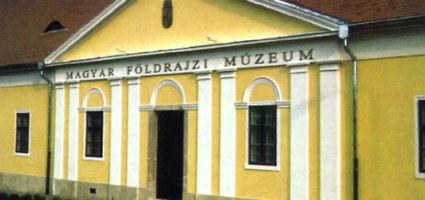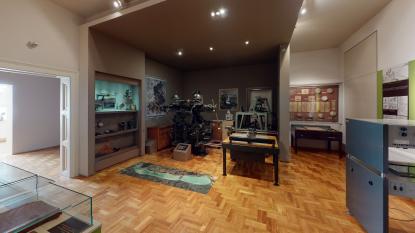2025. December 18. Thursday
Hungarian Geographical Museum - Érd
 |
Address: 2030, Érd Budai út 4.
Phone number: (23) 363-036
E-mail: foldrajzimuzeum@erd.hu
Opening hours: Tue-Sun 10-18
|
Museum tickets, service costs:
|
Ticket for adults
(valid for the exhibitions: Hungarian travellers and discoverers + The discoverers of the Carpathian Basin)
|
800 HUF
|
|
|
Ticket for adults
|
400 HUF
|
|
|
Ticket for children
(valid for the exhibitions: Hungarian travellers and discoverers + The discoverers of the Carpathian Basin)
|
400 HUF
|
|
|
Ticket for children
|
200 HUF
|
|
|
Ticket for pensioners
(valid for the exhibitions: Hungarian travellers and discoverers + The discoverers of the Carpathian Basin)
|
400 HUF
|
|
|
Ticket for pensioners
|
200 HUF
|
|
|
Combined ticket for adults
(valid for the all permanent exhibitions)
|
1000 HUF
|
|
|
Combined ticket for students
(valid for the all permanent exhibitions)
|
500 HUF
|
|
|
Combined ticket for pensioners
(valid for the all permanent exhibitions)
|
500 HUF
|
|
|
Guide
|
3000 HUF
|
/ exhibition
|
|
Guide
(on prior notice)
|
5000 HUF
|
/ exhibition
|
|
Photography
|
1200 HUF
|
The exhibition opened in 1988 honors the Hungarian scientists who took part in the researches in connection with Hungary beside the scientific discoveries of our country. The material of the show does not only come from the present area of Hungary since our past is connected to the whole Carpathian Basin.

In the first smaller ward the first scientists to scientifically describe Hungary are shown: Dávid Fröhlich, Mátyás Bél, Pál Kitaibel, and Elek Fényes.
The main furnishing of the 'Cholnoky-Room' are from the study of the scientist. Jenő Cholnoky, the scientist, writer, and painter, hosts his tutor, Lajos Lóczy who was the researcher of the Lake Balaton symbolically besides two of his students Pál teleki and Gyula Pricz.
In the largest ward, the most important representatives of the Hungarian cartography are shown. The first detailed map of Hungary, the work of the student Lázár, made in 1528 is shown here. It was not properly placed in its frame and it deters from the proper north-south line by 45-50 degrees. This mistake was not recognized for a long time and this work was the source of several wrong maps.
In the ward of the cartographers, many old and new equipments of land survey are displayed besides the apparatus, which was made to evaluate the photos taken from the air.
The visitors may also learn of the results of the most important scientific researches of Érd and its surroundings. The Hungarian quarry of the Neanderthal people is also here.
In the last ward the work of the scientists of geography, ethnography of Transylvania, Moldva, and Bukovina, the discovery of the 'underground Hungary', the caves and karst waters of our country is summarized.

In the first smaller ward the first scientists to scientifically describe Hungary are shown: Dávid Fröhlich, Mátyás Bél, Pál Kitaibel, and Elek Fényes.
The main furnishing of the 'Cholnoky-Room' are from the study of the scientist. Jenő Cholnoky, the scientist, writer, and painter, hosts his tutor, Lajos Lóczy who was the researcher of the Lake Balaton symbolically besides two of his students Pál teleki and Gyula Pricz.
In the largest ward, the most important representatives of the Hungarian cartography are shown. The first detailed map of Hungary, the work of the student Lázár, made in 1528 is shown here. It was not properly placed in its frame and it deters from the proper north-south line by 45-50 degrees. This mistake was not recognized for a long time and this work was the source of several wrong maps.
In the ward of the cartographers, many old and new equipments of land survey are displayed besides the apparatus, which was made to evaluate the photos taken from the air.
The visitors may also learn of the results of the most important scientific researches of Érd and its surroundings. The Hungarian quarry of the Neanderthal people is also here.
In the last ward the work of the scientists of geography, ethnography of Transylvania, Moldva, and Bukovina, the discovery of the 'underground Hungary', the caves and karst waters of our country is summarized.
